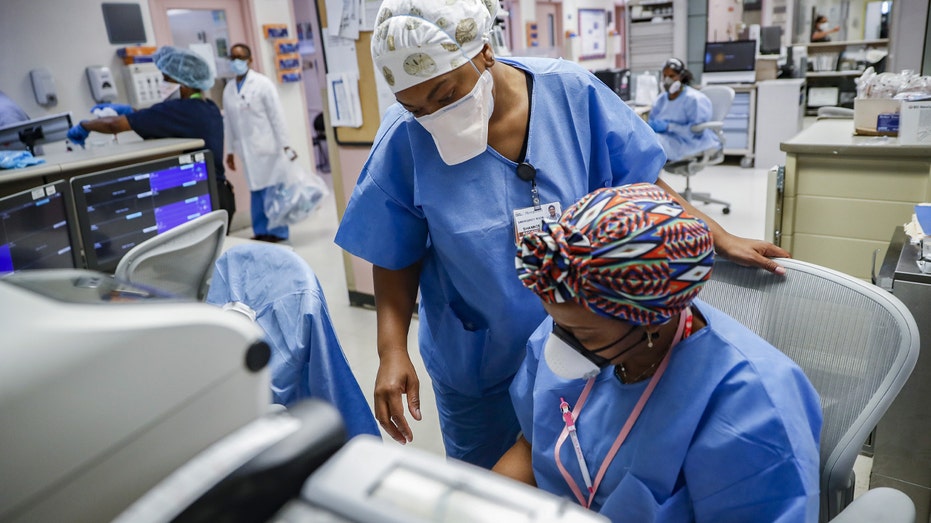Pandemic disruptions blamed for first increase in estimated tuberculosis deaths in more than a decade
2020 marked the first increase in global TB deaths since 2005
Hospital system notices lower-wage health care workers 50% more resistant to COVID vaccine
UMass Memorial Health Care president and CEO Dr. Eric Dickson describes how hospital vaccine mandates could worsen staff shortage problems.
Estimated deaths from tuberculosis—the deadliest infectious disease until the emergence of Covid-19—increased for the first time in more than a decade last year, the World Health Organization said Thursday, blaming severe disruptions in treatment and diagnosis caused by the coronavirus pandemic.
Using statistical models to help compensate for gaps in testing for and reporting of tuberculosis, especially in developing countries, the United Nations’ health agency estimated that around 1.5 million people died last year of the disease. That is up from 1.4 million estimated TB deaths in 2019. TB is a bacterial infection that most commonly affects the lungs and is especially dangerous for people with HIV and others with compromised immune systems.
Covid-19 has caused 4.88 million confirmed deaths globally, of which 1.88 million happened in 2020, according to Johns Hopkins University data. In contrast to the WHO data on tuberculosis, the Johns Hopkins Covid-19 toll only includes officially confirmed deaths from the disease and likely underrepresents the overall toll of the coronavirus, especially in developing countries, where testing has been poor.
JOHNSON & JOHNSON PLACES TALC INJURY CLAIMS IN BANKRUPTCY
If the WHO’s tuberculosis tally is correct, 2020 marked the first increase in global TB deaths since 2005.
The WHO report is one of the first to take stock of the consequences of the severe disruptions to the care and prevention of other infectious diseases caused by the pandemic, especially in developing countries. In late November or early December, the WHO is due to release its report on the estimated toll of malaria in 2020, which many public-health experts expect to show an increase from the estimated 409,000 deaths from the mosquito-borne illness in 2019.

Experts have also raised concerns over disruptions to routine early-childhood vaccinations due to the pandemic, which could lead to increased outbreaks of diseases such as measles in the coming years.
J&J REQUESTS FDA EMERGENCY APPROVAL FOR COVID-19 BOOSTER SHOT
Strict lockdowns, overwhelmed health systems and fear of catching Covid-19 stopped millions of people from getting tested or treated for tuberculosis last year, the WHO said. The number of people newly diagnosed with TB fell to 5.8 million in 2020, from 7.1 million in 2019, while the number of people seeking preventive treatment for the disease dropped 21% to 2.8 million. Around 150,000 people, meanwhile, were treated for drug-resistant TB, a 15% decline from 2019.
The WHO estimated that some 4.1 million people are currently infected with TB but haven’t been diagnosed, up from 2.9 million in 2019. The agency warned that its modeling suggests more people will develop TB and die from the disease in 2021 and 2022, as well.
Disruptions to diagnosis and care were among the most severe in Gabon, where the number of notified TB cases plummeted 80%; the Philippines, which saw a 37% decline; and in Indonesia and India, where notifications dropped by 31% and 25%, respectively.
GET FOX BUSINESS ON THE GO BY CLICKING HERE
The pandemic has also exacerbated longstanding funding challenges in the fight against TB. Funding for TB diagnostic, treatment and prevention—already less than half of what the WHO says is needed—dropped 9% to $5.3 billion in 2020, as countries shifted resources toward Covid-19.
"This is alarming news that must serve as a global wake-up call to the urgent need for investments and innovation to close the gaps in diagnosis, treatment and care for the millions of people affected by this ancient but preventable and treatable disease," said WHO Director-General Tedros Adhanom Ghebreyesus.




















